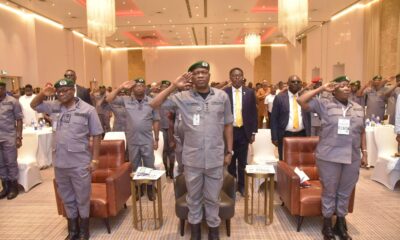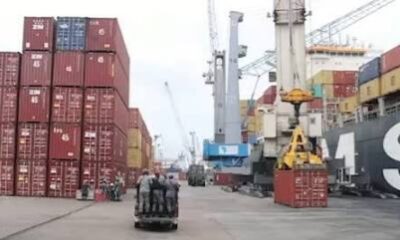Customs Report
‘CRFFN Bill Ambush Prevented ANLCA From Making Interventions’ Prince Shittu

BY EGUONO ODJEGBA
Another storm of controversy has erupted following revelations that the public hearing on the bill to consider the establishment of the Council for the Regulation of Freight Forwarding in Nigeria (CRFFN) at the National Assembly was hijacked by some Lagos entrenched interest group.
The alleged manipulation of the CRFFN Act and its operational mandate has triggered widespread concern over its impact on customs clearance, regulatory integrity, and the future of Nigeria’s maritime logistics sector.
According to industry veterans, the original intent of the CRFFN Act was subverted during its passage into law by virtue of the said ambush. The CRFFN covers the activities of customs clearing agents and freight forwarders in three principal zones nationwide, namely, western zone-Lagos, eastern zone-Port Harcourt, and northern zone-Kano.
The highly respected former president of the Association of Nigeria Licensed Customs Agents (ANLCA), Prince Olayiwola Shittu in an exclusive no-holds-bar interview with Pinnacle Time lamented that despite efforts by stakeholders from Port Harcourt and other regions to present alternative views, the legislative process was reportedly dominated by Lagos-based actors, aided by the Nigerian Shippers’ Council and private legal consultants.
These groups allegedly lobbied lawmakers to redefine freight forwarding in a way that excluded the regulatory role of the Nigeria Customs Service, Prince Shittu revealed.
Responding to question why ANLCA is complaining of irregularities in the CRFFN Act aftermath of its passage and approval, he explained that ANLCA’s input was quietly discarded by the Lagos ambush in collusion with the law makers that presided over the public hearing.
“They quietly removed customs regulation from the documentation process and later amended it to include licensed customs agents. It was a deliberate ambush”, the revered customs broker alleged.
This redefinition blurred the lines between freight forwarders and customs licensed agents, creating confusion over who is authorized to clear cargo and who should be regulated by which authority.
“I was resident in Port Harcourt when the bill was being considered. But without minding then inconveniences we flew to Abuja several times, myself and the then ANLCA National President, Chief Elochukwu to also make our own position. But Lagos is where everything happens, so those who were interested cornered the system, using the presence of Nigerian Shippers’ Council (NSC) and with some private lawyers to go and confuse the lawmakers behind the scene that ‘look everybody that is coming must be a freight forwarder”, Shittu said.
He further revealed that even the controversial professional operating fee (POF) got smuggled into the CRFFN Act afterward its passage, noting that freight forwarding is a misnomer in the act which ordinarily was conceived to cater for licensed customs brokers.
“What you need to find out first, who is a freight forwarder? A simple dictionary meaning of freight forwarder –you will see it there-somebody who is doing the performance of the movement of cargo from one place to the other; and the documentation. But they captured the documentation as customs documentation, but how do you get customs documentation done?
“Is by being regulated by the Customs, they removed that one quietly, and did amendment later to say ‘if you are doing documentation as licensed customs agent’. Because even the Professional Operating Fee (POF) which was being collected by CRFFN and with which Lucky Amiwero went to court was not in the original Act.
“It came in as Passing Resolution, and who are the people that will pay the money? It is the licensed customs agents that are responsible for clearance and delivery of goods.”
The fallout from this legislative sleight has created the ongoing regulatory conflict with profound distortion and disruption in the cargo clearing industry. This is because CRFFN was originally envisioned as a professional regulatory body has unfortunately devolved into a revenue generating agency to the chagrin of licensed customs agents it was designed to cater for. This is so since the introduction of the POF which was not part of the original Act is believed to have been added via resolution—and which has become a flashpoint.
Prince Shittu explained that efforts to mitigate the damage may have been frustrated by those gaining from the confusion, including the then supervisory transportation ministry.
“Along the line when l came on board as the president then, we looked at the thing and said no, the best way to go…we should not have a marriage of convenience, NAGAFF (National Association of Government Approved Freight Forwarders) with all your members go and take them with CRFFN, ANLCA with all other associations of licensed customs agents, you go ahead and be regulated by the Nigeria Customs Service. But they knew it was going to be difficult, so they were not forthcoming.”

The former ANLCA leader also revealed that NAGAFF driven by the urge to maintain a hold sided with the transportation ministry to hijack CRFFN to become an appendage of government.
“During the time of Chibuike Amaechi as minister of transportation, he fought against it ( corrective measure initiated by ANLCA) because he was already calculating how much income will come to the government. And that was the failure…because the Lagos ambush on the Act is the reason the ministry did everything it can do to bring CRFFN into their control.
Prince Shittu contends that the continued annexation of CRFFN will only continue to rob the practitioners of focus and industry wellbeing, while constituting a clog in the wheel of progress.
He also accused the pioneer Registrar and others of colluding with the transportation minister to derail the vision and objective of the CRFFN simply for pecuniary needs.
He further argued that the fallout from the alleged legislative sleight has been profound. CRFFN, originally envisioned as a professional regulatory body, has allegedly devolved into a revenue-generating agency. The introduction of the Professional Operating Fee (POF)—which was not part of the original Act but added via resolution—has become a flashpoint.
“The only clause that requires government intervention is if there is a dispute within the CRFFN Board and it becomes intractable, the minister of transport (marine and blue economy) can move in and rule in finality but not without consultation with the board members. So the independence of the Council was already established by the Act.
“But then the Registrar played into the hands of those who wanted to use government to feather their nest. That was why a lot of people were driving government vehicles as part of the largesse that the government was ready to dispense. So along the line, it is like a contour that you discover on a bent road because right from the beginning, he messed up.
“Now those who were thinking they will now make money out of the operation of CRFNN discovered that they have also been outplayed. Before Amaechi, there is something I need to emphasize, the Council itself with the Registrar found out about a consultant doing the collection of POF even with this disenchantment of the operators, especially our licensed custom agents, who knew that some people are just collecting this money for their own personal use.”
While condemning the opaque POF collection consultancy, Shittu also lamented the alleged conspiratorial disposition of NAGAFF which he noted was a poor reflection of competition, as its attitude encourage unwarranted financial losses by agents.
“Can you imagine a government agency that CRFFN has come to be now will engage a consultant and allegedly collecting 40% as their own agency fee for the purpose of collection? Can you imagine what that means? Several meetings were done where ANLCA said okay, ‘on behalf of our members at the end of the year, give us a percentage of our contribution so that we can use it to renew our licenses, pay rent for our offices, pay workers, etc.
“Even though there was a tacit agreement the other associations that may not be favorably disposed to it are those who may not gain from it because they don’t have a custom license with which to record the monies to pay. They kicked against it. And that’s what has happened to the CRFFN. CRFFN has been turned solely to money collection organization.”
According to him, the CRFFN talk about training are all empty talks and no more than just noise.
Prince Shittu disclosed that the real damage and danger to the regulatory overlap is that licensed customs agents, who are legally responsible for cargo clearance now share operational space with unregulated freight forwarders, leading to confusion and inefficiency.
Unlike licensed agents who are traceable and held liable for transactions, many freight forwarders operate without oversight, making it easier to abandon jobs or evade responsibility, he said.
While calling for a decisive inter-ministerial intervention to separate the roles of CRFFN and the Nigeria Customs Service, customs agents say that the lack of clear regulatory boundaries has enabled portfolio companies with no customs licenses to infiltrate the sector, undermining professionalism and increasing the risk of malpractice.
To return the industry to the path of progress, stakeholders have appealed to the federal government to undertake an urgent review of the CRFFN Act and separate the roles of CRFFN from that of the Nigeria Customs Service.
They argue that that while only companies licensed by customs should handle documentation and clearance, CRFFN on the other hand should oversight the activities of freight forwarders.
This is even as others say that without urgent reforms, the confusion between freight forwarding and customs clearance will continue to erode trust, inflate costs, and compromise national trade efficiency.
































